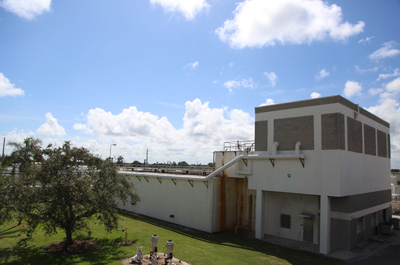
The City Council’s decision earlier this month to build a new sewage-treatment plant at Vero Beach Regional Airport was, as rookie member Joe Graves put it, a “no-brainer.”
While Graves clearly meant the decision was so obviously right that it did not require any thought, others suggested it should be applied with a different meaning to the council’s determination to keep Vero in the water and sewer business.
Like Vero’s electric utility – which before its sale a year ago to Florida Power & Light extorted tens of millions of dollars from county and Indian River Shores customers to subsidize low city property tax rates – the water-sewer utility is also a cash cow for Vero.
Over the 10-year period from fiscal 2009-10 through 2018-19, in fact, the city transferred nearly $9.6 million in profits to its general fund from the water-sewer utility.
That subsidy allows City Council members to avoid unpopular property-tax increases.
However, 38 percent of the city’s water-and-sewer customers reside outside the city limits – in Indian River Shores and the unincorporated South Beach area of the county – where they do not benefit from the artificially low property-tax rates enjoyed by the 62 percent of customers who live in Vero Beach.
And those out-of-city customers, who had no say in the council’s decision because they cannot vote in Vero Beach elections, will absorb 38 percent of the rate-payers’ share of the $58 million bill to build a new plant that will keep Vero in the water-and-sewer business.
Graves’ “no-brainer” comment came after the council was told the project’s price tag was $27 million less than the $85 million cost of connecting to the county’s wastewater system. There was no discussion of the financial implications of trying to negotiate the sale of Vero’s water-and-sewer utility to the county.
Most of the cost of the new plant will be paid for by loans, which will be repaid through higher water-and-sewer rates.
How much higher? Nobody knows.
As incredible as this might seem, the City Council voted 5-0 to build the new sewage-treatment plant without knowing how much it will cost the people who will pay for it.
Can you imagine signing a contract to buy a house without knowing what your monthly mortgage payments will be, or if you can afford them? Who does that? Why do that?
To push through a massive expenditure while everyone in Vero Beach was sheltering in place and social distancing because of the coronavirus pandemic?
“A delay today would not derive any benefit,” Mayor Tony Young said before the April 7 vote, “and would incur additional costs.”
That’s nonsense.
Neither Young nor the other council members who voted unanimously to approve the project know how much it ultimately will cost. All they know is what City Water and Sewer Director Rob Bolton told them in his 100-plus-page report, which said nothing meaningful about the financing that will greatly impact rates.
“They have an obligation to their rate-payers to run the numbers first, before making a decision on a $50 million project that’s going to impact customers for the next 30 years,” said Indian River Shores Vice Mayor Bob Auwaerter, who chaired the Vero Beach Utilities Commission and now is a County Commission candidate.
“They need to provide more than the construction costs,” he added. “They need to provide the operational costs and how they’re going to fund it, because that’s all going to impact the rates. You’d never get away with this in the private sector.”
Also, in an April 1 letter to the City Council, Auwaerter warned that the “extreme economic and financial crisis” created by the ongoing pandemic could “change the calculus dramatically” for funding such a project and urged the city to “assume no help from the state or federal government.”
At the very least, the council should have postponed its vote until City Finance Director Cindy Lawson explored the city’s borrowing options and conducted an analysis of how the project’s financing would impact customers’ rates.
“I don’t know how much they’re going to have to borrow, but the rates they’re charging are going to have to go up, especially if they want to continue to make a profit,” said County Commissioner Bob Solari, who lives in Vero Beach and represents the barrier island.
“They should just tax people to get their revenues, instead of raising utility rates to pay for other city services,” he added. “But they’re not concerned with the cost to the customers. They’re concerned only with the cost to the city.”
So, yeah, voting to build a new sewage-treatment play was a “no-brainer” for our City Council members, who didn’t care about what they didn’t know – what they had not bothered to find out.
They didn’t even have to think about it.



